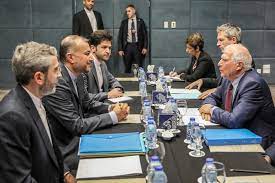DEAD SEA, Jordan (Reuters): The EU foreign policy chief told Iran’s foreign minister that Tehran should immediately halt military support for Russia and internal repression in Iran, reflecting worsening ties as diplomacy to revive the 2015 nuclear deal remains at a standstill.
EU foreign policy chief Josep Borrell said his meeting on Tuesday with Iranian Foreign Minister Hossein Amirabdollahian in Jordan, where both are due to attend a regional conference, was necessary “amidst deteriorating Iran-EU relations.”
While there is currently no sign of a return to talks, Borrell said the EU would continue to work with Iran on restoring the 2015 nuclear deal.
“Agreed we must keep communication open and restore #JCPOA on basis of Vienna negotiations,” Borrell said in a tweet, referring to talks which have been stalled since September.
The climb to salvage the nuclear pact has grown steeper of late.
Iran has brutally cracked down on street protests, while Western states say Russia has used Iranian drones in its war in Ukraine, and Tehran has accelerated its nuclear program, all of which raise the political price to giving Iran sanctions relief.
An Iranian foreign ministry statement said Amirabdollahian “announced his country’s readiness to engage directly with Ukraine to alleviate any misunderstanding regarding Tehran’s position in the Ukraine war.”
Iran has acknowledged supplying Moscow with drones but said they were sent before the war in Ukraine, where Russia has used them to target power stations and civilian infrastructure.
Abdollahian also voiced his condemnation of Western support of protests in Iran and the “illegal” sanctions against his country. He said Iran was ready to finalize the Vienna negotiations on the basis of the previous draft deal.
UNDECLARED SITES
The European Union and the United States have imposed new sanctions on Iranian officials over Iran’s crackdown on protests ignited by the death of 22-year-old Iranian Kurdish woman Mahsa Amini while in the custody of the morality police in September.
The protests mark one of the boldest challenges to Iran’s clerical leadership since the 1979 revolution. Iranian leaders have accused Western powers of fomenting the unrest which security forces have met with a deadly crackdown.
According to the activist HRANA news agency, 502 protesters and 62 members of security forces have been killed.
The nuclear talks stalled as Western powers accused the Islamic Republic of raising unreasonable demands after all sides appeared to be nearing a deal.
One obstacle has been an impasse over uranium traces at undeclared sites.
On Monday, UN nuclear watchdog officials left Iran after talks with the head of its nuclear energy organization, the semi-official ISNA news agency reported. It did not say whether they addressed the impasse.
Iran’s official IRNA news agency reported on Tuesday that Iranian nuclear negotiator Ali Bagheri Kani and EU nuclear talks coordinator Enrique Mora also attended Tuesday’s meeting.







